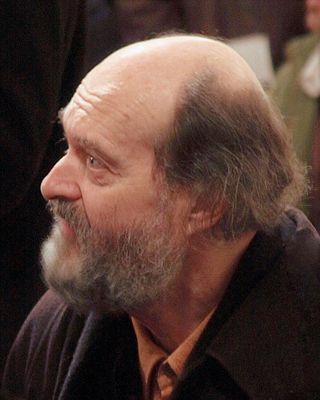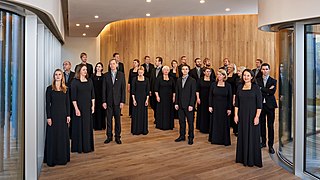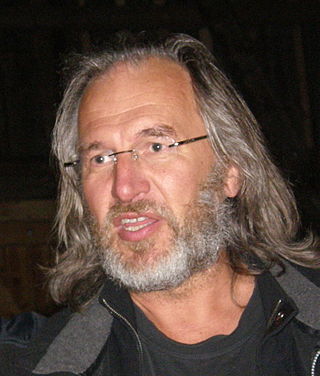Related Research Articles

Arvo Pärt is an Estonian composer of contemporary classical music. Since the late 1970s, Pärt has worked in a minimalist style that employs tintinnabuli, a compositional technique he invented. Pärt's music is in part inspired by Gregorian chant. His most performed works include Fratres (1977), Spiegel im Spiegel (1978), and Für Alina (1976). From 2011 to 2018, and again in 2022, Pärt was the most performed living composer in the world, and the second most performed in 2019, after John Williams. The Arvo Pärt Centre, in Laulasmaa, was opened to the public in 2018.

Estonian Philharmonic Chamber Choir (EPCC) is a professional choir based in Estonia. It was founded in 1981 by Tõnu Kaljuste, who was its conductor for twenty years. In 2001, Paul Hillier followed Kaljuste's tenure, becoming the EPCC's principal conductor and artistic director until September 2008, when Daniel Reuss took over the task. Since 2014 the choir's principal conductor has been Kaspars Putniņš. The repertoire of the EPCC ranges from Gregorian Chant to modern works, particularly those of the Estonian composers Arvo Pärt and Veljo Tormis. The group has been nominated for numerous Grammy Awards, and has won the Grammy Award for Best Choral Performance twice: in 2007 with Arvo Pärt's Da pacem and in 2014 with Pärt's Adam's Lament, the latter was shared with Tui Hirv & Rainer Vilu, Sinfonietta Rīga & Tallinn Chamber Orchestra; Latvian Radio Choir & Vox Clamantis. In 2018 Estonian Philharmonic Chamber Choir won the prestigious Gramophone Award with its recording of Magnificat and Nunc dimittis by Arvo Pärt and Psalms of Repentance by Alfred Schnittke.
The Estonian National Symphony Orchestra is a symphony orchestra based in Tallinn.
The Estonian Academy of Music and Theatre began as a mixed choir of the Estonia Society Musical Department (EMD) on the eve of World War I. The assembly of the Estonia Society created the Tallinn Higher Music School on November 17, 1918. The opening ceremony took place on September 28, 1919. In 1923 the educational institution was renamed the Tallinn Conservatoire. In 1938 the State Drama School was opened. In 1993 the school was renamed the Estonian Academy of Music. In 1995 the Drama Faculty was renamed the Higher Theatre School.

Berliner Messe is a mass setting by Estonian composer Arvo Pärt. Commissioned for the 90th Katholikentag in Berlin in 1990, it was originally scored for SATB soloists and organ. It was first performed at St. Hedwig's Cathedral on 24 May 1990, the Feast of the Ascension, with Paul Hillier conducting the Theatre of Voices. Pärt later (1997) revised the piece for chorus and string orchestra. Pärt uses his tintinnabuli technique throughout, with movements taking many forms within that style—flowing from quietly reverent duets between parts to full chorus proclamations of faith.

Te Deum is a setting of the Latin Te Deum text, also known as the Ambrosian Hymn attributed to Saints Ambrose, Augustine, and Hilary, by Estonian-born composer Arvo Pärt, commissioned by the Westdeutscher Rundfunk in Cologne, Germany, in 1984. Dedicated to the late Alfred Schlee of Universal Edition, the WDR Broadcast Choir premiered the Te Deum under the direction of conductor Dennis Russell Davies on January 19, 1985. The Te Deum plays an important role in the services of many Christian denominations, including the Paraklesis (Moleben) of Thanksgiving in the Eastern Orthodox Church. Because of the unusual instrumentation Pärt employs, his Te Deum is not suited for use within the Orthodox Church. It was recorded on the ECM New Series label in 1993 by the Estonian Philharmonic Chamber Choir and Tallinn Chamber Orchestra under the direction of Tõnu Kaljuste. The piece is approximately thirty minutes long.

Tõnu Kaljuste is an Estonian conductor.
The annual Glasperlenspiel Music Festival is a joint project of Eesti Kontsert and Estonian Record Productions since 1995. It is a leading musical event in the Estonian summer.
Veronika Portsmuth is an Estonian conductor and singer.
Martin Kuuskmann is a 3-time Grammy nominated Estonian-American virtuoso bassoonist. Noted for his performances and recordings spanning an extraordinarily wide range of styles, he has performed with many of the world’s leading orchestras and conductors.

Joep Franssens is a Dutch composer.

Da pacem Domine is a choral composition by Arvo Pärt on the Latin prayer for peace Da pacem Domine, first composed in 2004 for four voices. Different versions, also for and with string instruments, were published by Universal Edition.
Ülle Kaljuste is an Estonian stage, film, television and radio actress.

Pille Lill is an Estonian opera singer (soprano) and an active member of the cultural life, the founder and artistic director of PLMF Music Trust.

Cecilia, vergine romana is a composition for mixed choir and orchestra by Estonian composer Arvo Pärt, written in 2000 for the Great Jubilee in Rome. The Italian text deals with the life and martyrdom of Saint Cecilia, the patron saint of music, and was first performed on 19 November 2000, close to her feast day on 22 November, by the Accademia Nazionale di Santa Cecilia conducted by Myung-whun Chung.

Risto Joost is an Estonian conductor and operatic countertenor.
Paul Mägi is an Estonian conductor in concert and opera and is also an academic teacher and violinist. He has commissioned works for the Estonian National Opera.
Kristjan Kõrver is an Estonian composer.

Symphony No. 1 "Polyphonic" is the first symphony by Estonian composer Arvo Pärt. The symphony was written in 1963. It is dedicated to Estonian composer Heino Eller.

Savvas Karantzias is a Greek composer, conservatory director, and co-founder of the Festival European Polyphony.
References
- 1 2 3 4 "Biography". www.tko.ee. Retrieved 16 January 2025.
- 1 2 3 4 5 "Tallinn Chamber Orchestra". Estonian Music Information Centre. Retrieved 27 July 2020.
- ↑ "Tallinn Chamber Orchestra". Naxos Records . Retrieved 27 July 2020.
- ↑ "Tallinn Chamber Orchestra". Discogs . Retrieved 27 July 2020.